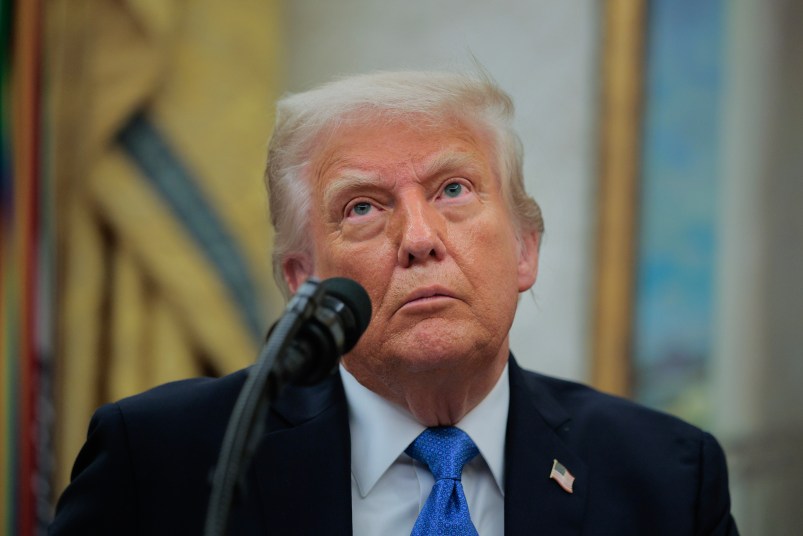The president rehashed a dubious graphic posted by the White House.
President Donald Trump raged late into the night, sharing a misleading poll graphic that claimed more than half of voters approve of his performance in his second term.
The president posted an image previously circulated by the White House, which asserted he had a 57 percent approval rating instead of the verifiable number of 49 percent.
The source listed in the graphic was Rasmussen Reports. At the time of Trump’s repost, Rasmussen’s daily tracker showed his actual approval rating at 47 percent, not 57 percent, according to the pollster’s official website.
The last time Trump’s Rasmussen approval rating came close to 57 percent was Jan. 23, just three days into his term, when the pollster recorded it at 56 percent.
White House deputy press secretary Abigail Jackson told the Daily Beast on Wednesday, “President Trump and his policies are wildly popular with the American people.”
When previously contacted, the White House referred the Daily Beast to Rasmussen posting the claim on X that Trump’s “single overnight approval for last night” was 57.11 percent.
Included in Rasmussen’s post was Trump’s White House portrait and a congratulatory message to White House deputy chief of staff Dan Scavino on his engagement.
Rasmussen did not immediately respond to the Daily Beast asking how it arrived at that number, why it wasn’t listed on its daily tracking poll, or the definition of an “overnight approval rating.”
Trump also amplified other controversial posts. He logged onto Truth Social to reshare a post in which he promoted an unproven link between autism and the pain reliever Tylenol.
In an all-caps rant, he claimed in that post that pregnant women should avoid taking acetaminophen “UNLESS ABSOLUTELY NECESSARY” and to avoid giving it to young children “FOR VIRTUALLY ANY REASON.”
The medical community and officials including Senate Majority Leader John Thune have raised concerns over the claims. Trump did not cite evidence to support his claim.
Trump also posted what appears to be a letter from the 1960s by former Attorney General Robert F. Kennedy. It seems to reference an episode mentioned in a History.com article the president also shared, which describes President John F. Kennedy’s decision to federalize the Alabama National Guard to halt Gov. George Wallace’s blockade of the University of Alabama in 1963.
It comes as the Trump administration embarks on an aggressive new crime crackdown, pushing to expand federal law enforcement operations in major cities and deploy the National Guard to urban areas.
“My goal is very simple. STOP CRIME IN AMERICA!” Trump added in another post.






